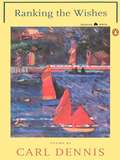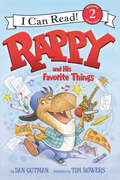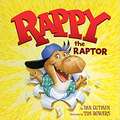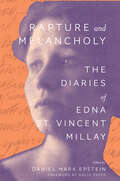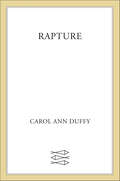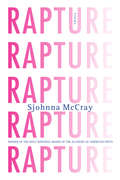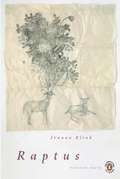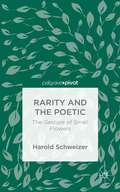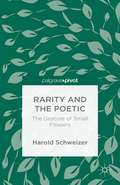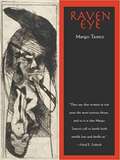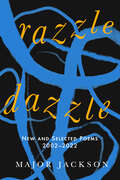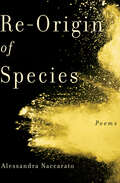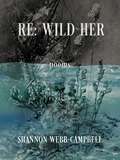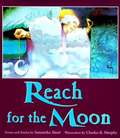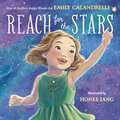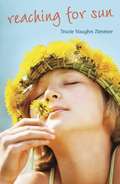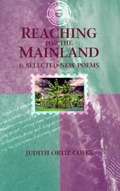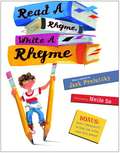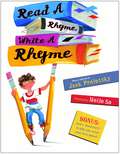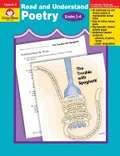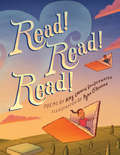- Table View
- List View
Ranking the Wishes
by Carl DennisIn his seventh book, Carl Dennis explores the ways in which our wishes - those in our power to fulfill at any moment and those that have no chance of ever being realized - define who we are. While some of the poems view wishing as a failure to do justice to the world we have, others regard it as a recognition that no present, however rich, can satisfy the imagination, and suggest that one of the functions of poetry is to keep significant wishes alive. In showing with moving clarity how wishes are essential to giving shape and direction to the moment, these poems make use of a rich variety of genres: elegy, advice, meditation, warning, consolation, and prophecy. .
Rap a Tap Tap, Here's Bojangles--Think of That!
by Leo Dillon Diane DillonThis book for young children tells the story of Bill "Bojangles" Robinson--an African-American tap dancer and one of the most popular entertainers of the 1920's-30s.
Rappy and His Favorite Things (I Can Read Level 2)
by Dan GutmanRappy the Raptor’s class has to write poems about their favorite things for Poetry Week, and the best poet will win a cupcake! Will Rappy discover he’s a poet and he didn’t even know it? Beginning readers will love rapping along to this Level Two I Can Read tale as Rappy, his classmates, and even their teacher, Mrs. H, rap about everything from flying kites and pillow fights to snow days and mayonnaise!Rappy and His Favorite Things is a Level Two I Can Read book, geared for kids who read on their own but still need a little help.
Rappy the Raptor
by Dan GutmanMeet Rappy the Raptor, a velociraptor who speaks in rhymes all of the time, whether it's morning or noon, October or June. Now, how did it happen that he started rappin'? Well, here's Rappy's story in all its glory! <P><P>New York Times bestselling author Dan Gutman and New York Times bestselling artist Tim Bowers team up for a funny, warm story that is sure to have readers snapping their fingers and tapping their toes! Parents and kids alike will love bopping along as Rappy learns to embrace his unusual way of speaking in this upbeat picture book with a dino-size beat.
Rapture and Melancholy: The Diaries of Edna St. Vincent Millay
by Edna St. MillayThe first publication of Edna St. Vincent Millay&’s private, intimate diaries, providing &“a candid self-portrait of the &‘bad girl of American letters&’&” (Kirkus Reviews &“Provides an occasion to revisit not just [Millay&’s] improbable life but also her sometimes revelatory work. . . . Hopefully the release of this complex woman&’s diaries will draw readers&’ attention to the complexity of her work, which offers much more than figs and ferries.&”—Abigail Deutsch, Wall Street Journal &“These diaries show us the young writer who was a sensitive, often forlorn, aspirant and the established poet at the apex of literary fame who achieved her wildest early fantasies.&”—Declan Ryan, PoetryFoundation.org The English author Thomas Hardy proclaimed that America had two great attractions: the skyscraper, and the poetry of Edna St. Vincent Millay. In these diaries the great American poet illuminates not only her literary genius, but her life as a devoted daughter, sister, wife, and public heroine; and finally as a solitary, tragic figure. This is the first publication of the diaries she kept from adolescence until middle age, between 1907 and 1949, focused on her most productive years. Who was the girl who wrote &“Renascence,&” that marvel of early twentieth-century poetry? What trauma or spiritual journey inspired the poem? And after such celebrity why did she vanish into near seclusion after 1940? These questions hover over the life and work, and trouble biographers and readers alike. Intimate, eloquent, these confessions and keen observations provide the key to understanding Millay&’s journey from small-town obscurity to world fame, and the tragedy of her demise.
Rapture: Poems
by Carol Ann DuffyWinner of the T. S. Eliot Prize, "essential reading for the broken-hearted of all ages" (The Guardian)The effortless virtuosity, drama, and humanity of Carol Ann Duffy's verse have made her much admired among contemporary poets. Rapture is a book-length love poem and a moving act of personal testimony. But what sets these poems apart from other treatments of the subject is Duffy's refusal to simplify the contradictions of love and read its transformations-infatuation, longing, passion, commitment, rancor, separation, and grief-as either redemptive or destructive. This is a map of real love in all its churning complexity, simultaneously direct and subtle, showing us that a song can be made of even the most painful episodes in our lives. With poems that will find deep resonance in the experience of most readers, it is a collection that can and does speak for us all.
Rapture: Poems
by Sjohnna McCrayBecause I can never say anything plainly. Because I always stutter politely. Because there's always the chatter before the kiss. --from "In Need of Subtitles"In this award-winning debut, Sjohnna McCray movingly recounts a life born out of wartime to a Korean mother and an American father serving during the Vietnam War. Their troubled histories, and McCray's own, are told with lyric passion and the mythic undercurrents of discovering one's own identity, one's own desires. What emerges is a self- and family portrait of grief and celebration, one that insists on our lives as anything, please, but singular. Rapture is an extraordinary first collection, with poems of rare grace and feeling.
Raptus
by Joanna KlinkNew from a poet whose "intensity makes the world visible" (Linda Gregg) "Everywhere, a forceful, scrupulous intelligence is active- a luminous diction, a range of cadences." So has Mark Strand written of the work of Joanna Klink, who has won acclaim for elegant, sensual, and musical poems that "remain alert to the reparations of beauty and song" (Dean Young). The linked poems in Klink's third collection, Raptus, search through a failed relationship, struggling with the stakes of compassion, the violence of the outside world, and the wish to anchor both in something true.
Rarity and the Poetic: The Gesture of Small Flowers
by Harold SchweizerRarity is a quality by which things flowers, leaves, light, sound fleetingly appear and disappear, leaving in their wake a resonance of something we just thought we had glimpsed. Each of the nine chapters in this book pursues such intimations of rarity in poetic ideas, images, and silences.
Rashmi
by Mahadevi VermaRashmi is a collection of new and old poems of Mahadevi Verma. The collection as a regular feature incorporates the feature of chayavaad. A great source of learning for students of Hindi literature.
Raven Eye (Sun Tracks #60)
by Margo TamezWritten from thirteen years of journals, psychic and earthly, this poetry maps an uprising of a borderland indigenous woman battling forces of racism and sexual violence against Native women and children. This lyric collection breaks new ground, skillfully revealing an unseen narrative of resistance on the Mexico–U.S. border. A powerful blend of the oral and long poem, and speaking into the realm of global movements, these poems explore environmental injustice, sexualized violence, and indigenous women’s lives. <p><p> These complex and necessary themes are at the heart of award-winning poet Margo Tamez’s second book of poetry. Her poems bring forth experiences of a raced and gendered life along the border. Tamez engages the experiences of an indigenous life, refusing labels of Mexican or Native American as social constructs of a colonized people. This book is a challenging cartography of colonialism, poverty, and issues of Native identity and demonstrates these as threats to the environment, both ecological and social, in the borderlands. Each poem is crafted as if it were a minute prayer, dense with compassion and unerring optimism. <p><p> But the hope that Tamez serves is not blind. In poem after poem, she draws us into a space ruled by mythic symbolism and the ebb and flow of the landscape—a place where comfort is compromised and where we must work to relearn the nature of existence and the value of life.
Razzle Dazzle: New and Selected Poems 2002-2022
by Major JacksonOne of Literary Hub's Most Anticipated Books of 2023 An exuberant collection of two decades of Major Jackson’s passionately intelligent poetry. A preeminent voice in contemporary literature, Major Jackson offers steady miracles of vision and celebrations of language in rapturous, sophisticated poems. Razzle Dazzle traces the evolution of Jackson’s transformative imagination and fierce music through five acclaimed volumes: his Cave Canem Poetry Prize–winning debut, Leaving Saturn (2002), which captures the spirit of resilience in the Philadelphia neighborhoods of the poet’s youth; Hoops (2006), which finds transcendence in the solemn marvels of ordinary lives; Holding Company (2010), which shifts away from narrative to explore the seductive force of art, literature, and music; Roll Deep (2015), which addresses human intimacy, war, and the spirit of aesthetic travel; and his vulnerable, philosophical latest, The Absurd Man (2020). The volume opens with over three dozen new poems that erupt into full-throated song in the face of indignity and invite us into a passionate experience of the world. Taken together, these two decades of writing offer a sustained portrait of a poet “bound up in the ecstatic,” whose buoyant lyricism confronts the social and political forces that would demean humanity. Equally attuned to sensuous connection, metaphysical inquiries, the natural world, and ever-changing urban landscapes, Jackson possesses a sensibility at once global and personal, driven by an enduring conviction in the possibilities of art and language to mark our lives with meaning. Whether addressing racial conflict and the ongoing struggle for human dignity in America, bearing witness to the plight of refugees, or grieving the contradictory nature of humankind, these dexterous poems proclaim the remarkable power of renewal, justice, and accountability.
Re-Origin of Species
by Alessandra NaccaratoWinner of RBC Bronwen Wallace Award for Emerging WritersWinner of CBC Poetry PrizeFrom hybrid bodies to shifting landscapes, Re-Origin of Species blurs the lines of the real. These poems journey through illness and altered states to position disability and madness as evolutionary traits; skilled adaptations aligned with ecological change.A lyric contemplation of our relationship to the environment, this book looks at the interdependence of species. Weaving personal narratives with a study of the insect kingdom, it draws parallels between human illness, climate change, and the state of peril in the natural world.
Re-Origin of Species
by Alessandra NaccaratoWinner of RBC Bronwen Wallace Award for Emerging WritersWinner of CBC Poetry PrizeShortlisted for the 2020 Gerald Lampert Memorial AwardLonglisted for the 2020 Pat Lowther Memorial AwardFrom hybrid bodies to shifting landscapes, Re-Origin of Species blurs the lines of the real. These poems journey through illness and altered states to position disability and madness as evolutionary traits; skilled adaptations aligned with ecological change.A lyric contemplation of our relationship to the environment, this book looks at the interdependence of species. Weaving personal narratives with a study of the insect kingdom, it draws parallels between human illness, climate change, and the state of peril in the natural world.Praise for Re-Origin of Species:"In this debut collection of startling beauty, Alessandra Naccarato weaves together the mythological and mundane, the ephemeral and the eternal, into a luminous tapestry of lyric and narrative. Naccarato's shimmering threads illuminate the connections that bind together every living thing on every level of being—from the interpersonal, to the political, to the spiritual. This is exquisite, playful, intentional poetry—and it just might be medicine for us all." —Kai Cheng Thom, author of I HOPE WE CHOOSE LOVE: A Trans Girl's Notes From the End of the World"What a hive of a book—these poems are so urgent, gorgeous, and necessary. Re-Origin of Species is a siren's call and warning siren all at once." —Leah Horlick, author of For Your Own Good"Ranging from the sting of personal loss to navigating landscapes full of promise, Naccarato?s poetry interrogates the place where the personal meets the wild." —2015 RBC Bronwen Wallace Award Jury
Re: Wild Her
by Shannon Webb-CampbellIn nature, rewilding restores biodiversity and ecosystems. In this new collection from award-winning poet Shannon Webb-Campbell, it is a form of Indigenous resurgence and pleasure.Drawing upon ecology, traditional knowledge, and sexuality, Re: Wild Her is a personal and poetic awakening. In these pages artistry and nature are intertwined, speaking to the sensual musings of lovers in Paris, driftwood and death cycles, and the rise of wild swimming and cold dipping. Throughout, reclaiming one’s divine femininity is celebrated as a powerful act of resistance and rejuvenation. These “poem spells” each offer a different prism with which to rewild ourselves, answering the call: How does joy help us cope with the harsh realities and complexities of life? How does poetry help us move forward? Re: Wild Her is an invitation to catapult into the otherworldly, to dive with the muses, and to resubmerge ourselves in joy.
Reach for the Moon
by Samantha AbeelPoetry, written by a girl with learning disabilities, reflects her feelings and experiences.
Reach for the Stars
by Emily CalandrelliFrom Emmy-nominated science TV star and host of Netflix’s hit series Emily’s Wonder Lab Emily Calandrelli comes an inspirational message of love and positivity.From the moment we are born, we reach out. We reach out for our loved ones, for new knowledge and experiences, and for our dreams!Whether celebrating life’s joyous milestones, sharing words of encouragement, or observing the wonder of the world around us, this uplifting book will inspire readers of every age. A celebration of love and shared discovery, this book will encourage readers to reach for the stars!
Reaching for Sun
by Tracie Vaughn ZimmerJosie Wyatt knows what it means to be different. Her family's small farmhouse seems to shrink each time another mansion grows up behind it. She lives with her career-obsessed mom and opinionated Gran, but has never known her father. Then there's her cerebral palsy: even if Josie wants to forget that she was born with a disability, her mom can't seem to let it go. Yet when a strange new boy--Jordan--moves into one of the houses nearby, he seems oblivious to all the things that make Josie different. Before long, Josie finds herself reaching out for something she's never really known: a friend... and possibly more. Interlinked free verse poems tell the beautiful, heartfelt story of a girl, a family farm reduced to a garden, and a year of unforgettable growth.<P><P> Winner of the Schneider Family Book Award
Reaching for the Mainland and Selected New Poems
by Judith Ortiz CoferThis work includes a selection of new poems as well as the original poems from Reaching for the Mainland, a body of poems that appeared in the collection Triple Crown.
Read a Rhyme, Write a Rhyme
by Jack PrelutskyFrom the book: Here, with poems on ten themes, such as birthdays and bugs, food and friends, is something new and delightfully different-- poem starts. Jack provides the opening lines, gives several suggestions of what you might think about--even some rhyming words to play with--then invites you to grab some paper and a pencil and finish the poem as you please. Maybe you didn't know it, but you too can be a poet! Includes picture descriptions.
Read a Rhyme, Write a Rhyme
by Jack Prelutsky Meilo SoWhen Jack Prelutksy posted the first couplet of a funny poem on a Web site and invited children to finish it, he expected about 100 responses. He got thousands. Now he has come up with an anthology of poems on 10 popular subjects by well-known poets and combined it with his own “poemstarts.” Included with each poemstart are suggestions for various ways the reader might continue the poem. With large type and a big red stop sign, it is made abundantly clear that the reader get a pencil and paper to complete the poem. Jack Prelutsky has been credited with making poetry fun for children to read. Now he is making poetry fun for children to write!
Read and Understand Poetry, Grades 3-4
by The Editors at the Evan-MoorEvan-Moor's Read and Understand Poetry series has been developed to provide students and their teachers with a structured approach for working with poetry.
Read! Read! Read!: Journey To The West (Penguin Active Reading (graded Readers) Series)
by Amy Ludwig VanDerwaterCapture the joys of reading in this amazing poetry collection! From that thrilling moment when a child first learns to decipher words, to the excitement that follows in reading everything from road signs to field guides to internet articles to stories, these poems celebrate reading. They also explore what reading does -- how it opens minds, can make you kind, and allows you to explore the whole world. Ryan O&’Rourke&’s rich artwork beautifully captures the imagination and playfulness in these poems by noted author Amy Ludwig VanDerwater.
